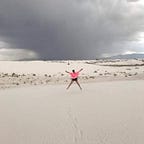Ambar Januel, Creative Strategy & Community Consultant, joins Travel Tech Con 2018
We are happy and excited to welcome Ambar to Travel Tech Con 2018! Looking forward to learning more on community building for startups at Ambar’s workshop on June 8.
What are the biggest challenges or pitfalls you’ve seen among travel startups building communities for their products?
Often founders are so focused on their product that they don’t give themselves a chance to step back and see it from an outside perspective. We have to remember that the people engaging in a product are human — not technical beings (for the most part), but community driven, tactically lacking, emotionally charged humans. In general, tech startups tend to be so focused on the development of the product that they don’t put a lot of consideration into the development of the outward facing product (the face of the brand: website, social media, founders, etc.). As founders, as entrepreneurs, as developers, YOU are the face of your brand, and you are founding a community too. Yes, your product needs to be strong first. But next, your community needs to be well crafted, thoughtful, and engaging.
Here are a few questions to consider:
Is your mission clear in your tagline?
It does not need to be lofty or elaborate, simply saying “create stuff” might do it, but your brand voice needs to come across clearly.
Have you allowed your peers to review your website and social media?
Are all the links connected? Is your website simple and easy to use? Do we know WHY you created this product?
Do you have a built in community?
Your first steps at creating a community for your product stems from your (and your teams) community. Are they being supportive, vocal, and engaged? If your immediate community isn’t engaged, this is an issue. Passion cannot be created or bought, your product needs to create an innate desire to support and be a part of something (the community for the product).
What’s the best way to estimate ROI from community building efforts for a startup?
As with every startup, we have one main goal for the marketing and sales departments. What are the typical examples of this?
- App downloads
- Product sales
- Accounts created
- Tickets sold
- Etc.
We all get this right?
So here comes the tough part. How do we track WHERE those completed actions are coming FROM?
Well, sure, there’s the standard places (Google Analytics, CRMs, discount codes, app downloads, surveys, etc). I’m pretty sure we’ve got this down (and no, social followers do NOT count if they’re not converting).
But the purest form of tracking ROI for a product and platform is in its community, and directly in the engagement happening within that community.
Here are the questions to ask yourself to know if what you’re doing is working:
Do you have strong customer service?
Do you have favorable reviews and customer referrals?
Does your digital community engage with your product?
Does your community come back to your product without reminders?
Does your community share your product without being asked too?
Is the community creating a network within itself — are they trying to be engaged with each other?
Is your community growing day in and day out?
Is your community challenging you to make your product better and stronger (and thus evolve)?
And lastly, as a founder, how deeply involved are you with your community?
Now, this might not be straight data and numbers, but the fact is, if your community isn’t excited, engaged, and emotionally tied to your product you will NOT grow. If you are not deeply tied to and engaged with your product AND your community, it will NOT grow.
We seem to be moving towards both — ultra global and ultra local communities. How does it affect travel products of tomorrow?
A few years ago when I was working with startups everyone was trying to create a product that worked for the largest amount of the population possible. Facebook was booming, social platforms were in. Everyone wanted to create something with a similar mass amount of download numbers. But now, startups are realizing the value in niche apps and developments. Because of social and political changes that have happened, organizations and companies are suddenly vocal about views and opinions they would have kept private a few years ago. This has given startups a space to work in smaller markets at niche levels.
From a global perspective, there are products lacking internationally that will have the chance to take on a large amount of the population. We are traveling more and more, and remote work is steadily becoming the norm. Networking communities, on-demand travel services and apps are in higher demand than they’ve ever been before. We’ll see a huge growth in this space as developers start working on apps and products that we straight up did not need a few years ago.
Remember when Airbnb came out and a lot of people were freaked out by the idea?
Or how we were told not to get into strangers cars as kids, and now we actually pay strangers to drive us around?
Our social dynamic is changing and the travel tech scene should take advantage to innovate openly. This is a fast-growing industry that has a lot of opportunity for growth. If you have an idea for a service, the pure truth is, if you don’t create it someone else probably will.
Looking forward to Ambar’s workshop — join us at Travel Tech Con 2018 to get hands on training on community building for startups!
